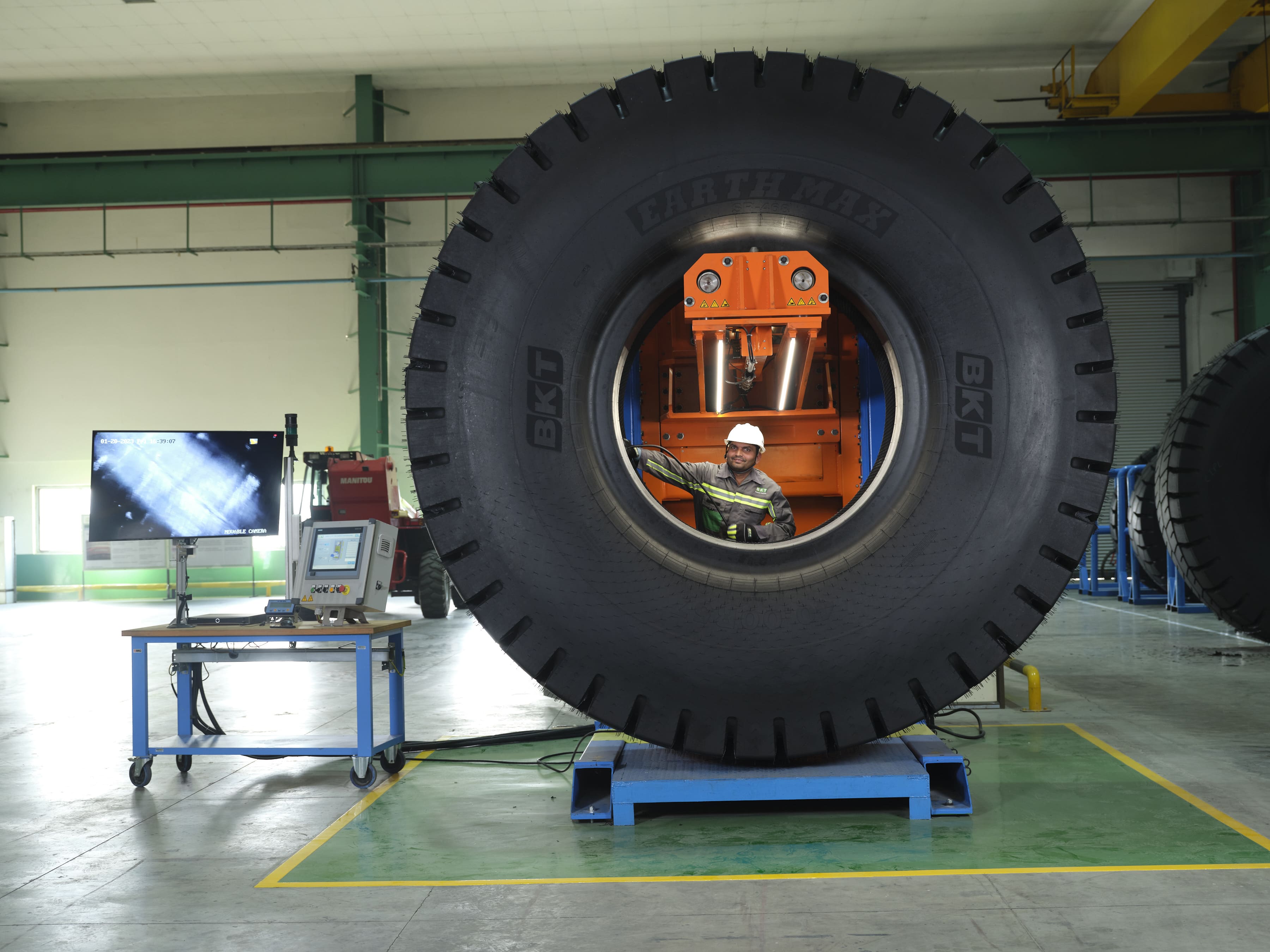
With an audience of assembled global off-highway equipment trade media and BKT management and workers looking on while standing on the newly acquired site of what will be the company's second carbon black production facility, second power plant and new rubber tracks for agriculture machinery assembly line and with BKT's current impressive Bhuj site visible a short distance away, Gabriella Usiello highlighted the significance of BKT's next growth phase.
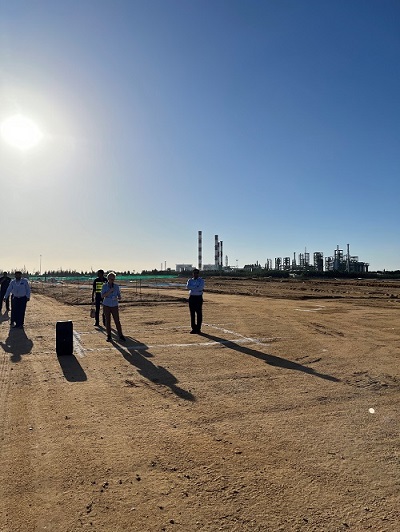
"We are incredibly proud of this new acquisition and the growth opportunities it offers BKT. We are constantly looking for ways to improve and grow. This additional land is going to be another game-changer for us, giving us more room to expand our production capabilities and take our operation to the next level," said BKT's marketing and communication manager, adding, "We are confident that with this new site, we will continue to produce the highest quality products and meet the demands of our customers."
Usiello's speech after a short bus trip to the site of the proposed 65-acre extension to BKT's current 258-acre, 2012-opened Bhuj operation followed an extensive global trade media tour of the 4,770-plus employee facility. The vast site is more like a village with its large and growing onsite employee and employee family accommodation, shops, a school, medical services, and sports and other recreational facilities. By the end of next year, 1,240 employee families and 400 bachelors will be living at BKT Bhuj. The BKT Bhuj enlargement works are expected to be completed in 18 months to two years.
The next day at The Trident Hotel in Mumbai for a press conference under the trip's theme, Enter the Future, the large global trade media party heard from a number of top BKT executives, including chairman and managing director Arvind Poddar and joint managing director Rajiv Poddar.
"In our future, BKT will double its turnover. In our future, the combination of production, distribution and brand promotion will allow us to achieve new standards," said Arvind Poddar.
"People have asked me if all this was really necessary; so much in such a short time. The goals we set ourselves when we decided to open the Bhuj site were proportional to the financial solidity of the time but above all to a vision which is as great as it is concrete," said Rajiv Poddar.
"Growth has always been in step with demand. Global tyre demand is growing, and we see no signs of it slowing down over the next five years. This demand started to rise during the 2020 pandemic, which today is above pre-Covid levels.
"The journey we started out on at Bhuj in 2012 was never a return journey, but one to prepare ourselves to discover the future."
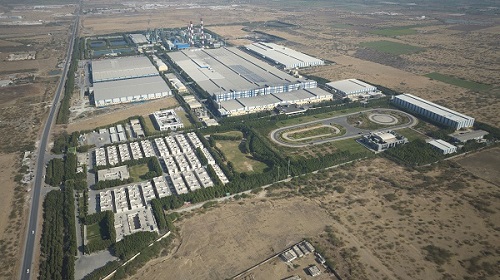
BKT's 25" to 57" off-the-road (OTR) tyre range spans many industries, including construction, quarrying, mining, industrial, earthmoving, port and agriculture. The company has over 10,000 employees and offers a staggering 3,200 products in 160 countries across five continents. With its global headquarters in Mumbai, the company has three subsidiaries: BKT Europe in Seregno, near Milan, Italy – which has a 10% share of the continent's OTR tyre market; BKT USA in Copley, Ohio; and BKT Tires in Toronto (Canada). Then there are BKT's six production sites in India, one in Bhiwadi, Chopanki, Dombivali and Bhuj, and, since autumn 2021, two in Waluj, a large village located to the west of the city of Aurangabad in the central part of Maharashtra state.
BKT's consistent investment in digitalisation and automation at its current Bhuj site has increased production speed, volume and final product quality. The amount of product discarded is reduced, increasing the sustainability of the manufacturing process and reducing production costs. Processes are also becoming increasingly reliable, and most importantly for BKT, occupational health and safety risks are drastically reduced, and worker comfort is improved.
The extended facility and its new fully digitalised carbon black plant dedicated to external sales and state-of-the-art rubber tracks assembly line will meet significantly increased market demand for these products. It is anticipated that 5% ($100mn) of BKT's targeted $2bn annual turnover by 2026 will be generated by carbon black sales – with the 198,600 tonnes production earmarked for 2023 for internal tyre tread production and external sales, set to rise to 500,000 tonnes per year by 2026.
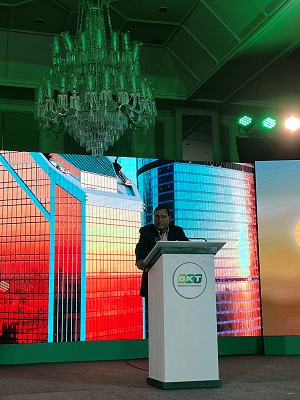
Moving rubber tracks assembly to a new purpose-built site will also free up space to allow BKT to increase its off-the-road tyre range output at times of higher customer demand.
Carbon black is produced by a hydrocarbon fuel [gas or oil] reaction to limited combustion air at 1320 to 1540°C. The unburned carbon is collected in an extremely fine, fluffy, black particle, 10 to 500 nanometres (nm) in diameter, and this 'carbon black' is used to strengthen the tyre rubber compound.
BKT Bhuj's carbon black plant began operating in 2017 when 65,000 tonnes of hard-grade carbon black for tyre treads were produced yearly. In the following year, production increased to 110,000 tonnes and saw the addition of production of soft-grade carbon black, which is used in the casing compound to improve its strength and durability, generating less heat. In 2021, the total production of the two types of carbon black reached 138,000 tonnes per annum, while last year, it rose to 165,600 tonnes. The goal for 2023 is 198,600 tonnes. BKT Bhuj's research and development centre also plans to add a third 'speciality' type of carbon black, which has different properties to carbon black used in rubber compounds. These properties offer high resistance to colouring, a high purity level, a low ash level and a very low level of PAHs. This makes speciality carbon black suitable for specific applications such as paints, plastics and inks.
BKT has also introduced a new approach to carbon black production by making the whole process more sustainable. For carbon black transportation, BKT substituted bulk bag containers with mobile silos. This means that the tyre production plant receives the carbon plant using mobile silos transported pneumatically to the storage. This will eliminate the need for BKT to use 100,000 bulk bags over the next few years. Furthermore, the whole transport system is also designed to reduce energy usage, consumption and quality. Every transfer system is controlled by weight and energy used – with BKT aiming to reduce energy consumption by up to 70%. This saves more than two million kilograms of CO2 emissions annually, comparable to 5,000 100m² apartments.
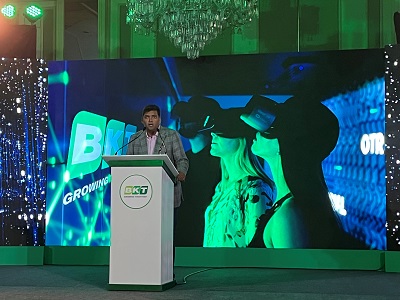
At the same time, the gas used to manufacture carbon black is now ending up in a co-generation plant able to reuse 75,000m³ of gas per year. This saves 215,000 tonnes of coal per year.
BKT Bhuj's power plant became operational in 2013, giving the site a reliable and controlled source of electricity. Today, solar panels and the cogeneration plant allow the facility to self-produce energy. Last year, the cogeneration plant was expanded from 20MW to 40MW per year, and work is underway to increase the power generated by self-produced renewable resources.
Water is also at the heart of BKT Bhuj's power plant sustainability. Since 2019, a zero-liquid discharge (ZLD) principle has been adopted, meaning no liquid waste is released outside the plant. All water used in the plant is treated, purified and reused. The objective of the ZLD principle is to conserve water resources, reduce the environmental impact of wastewater discharge and improve the plant's overall efficiency and sustainability.
When the first tyre rolled off the Bhuj production line in 2012 after a $500mn investment, the plant was located on 123 hectares. Before starting the works, the desert landscape was completely arid; there was neither water nor electricity. But after laying many kilometres of drinking water pipes and power lines, the site grew exponentially: 126 hectares in 2016, 131 in 2019, 137 in 2021, and 258 in 2022. By the end of 2023, the forecast is to reach a total surface area of 323 hectares, of which 283 acres have already been acquired.
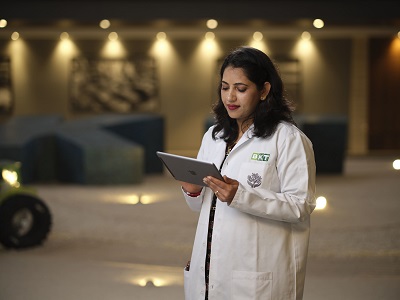
More space means more possibility to install new machines, accommodate more test areas, and increase volumes and all that goes with it. From 92 tonnes of daily production in 2015, BKT Bhuj ended 2022 with its best result ever, 436 tonnes daily. This is timely, as BKT's business has, as Rajiv Poddar noted in his Mumbai press conference presentation, increased by 49% compared to the pre-pandemic period. This remarkable achievement reflects the Indian multinational's readiness to embrace new opportunities and challenges.
BKT spends 3.5% a year of the company's turnover on research and development (R&D). BKT Bhuj's R&D Centre is said by the company to be the "cradle which allowed the Bhuj site to grow into what it is today". Established in 2017, this hub develops products and processes to ensure BKT can maintain its international off-the-road tyre leadership. Led by a specialist team of researchers and analysts, it remains one of the world's most important and up-to-date tyre research centres.
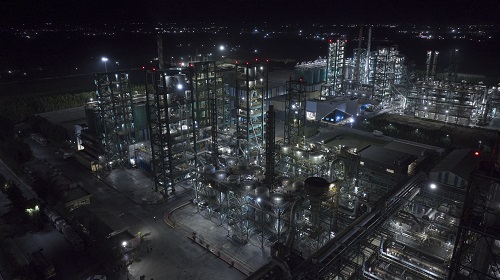
Looking for the right solution also means testing it. For this reason, a special test track was inaugurated in the R&D centre's first year. With six different tracks, this circuit includes tracks for tyre performance tests in dry and wet conditions, an asphalt track and a sloping concrete track. Thanks to a wide variety of tests, many important characteristics such as traction, handling, comfort, soil compaction and much more can be measured here, thanks to high-precision devices and instruments.
Having seen the vast BKT Bhuj site first-hand and after listening to BKT's senior management team lay out the company's hugely ambitious growth vision, few would bet against such a vision becoming a reality in 2026.













